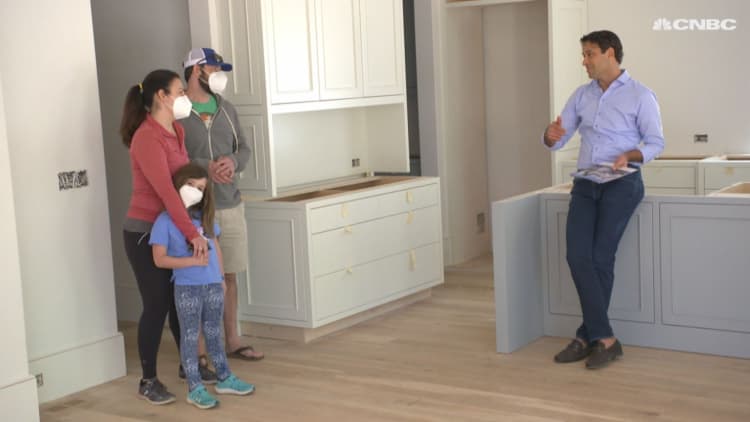In the best of times, retirement isn't easy.
The coronavirus has only unsettled people even further.
The personal finance app Personal Capital surveyed retirees and full-time workers in May. More than a third who were planning to retire in 10 years said the financial fallout from Covid-19 means they'll delay.
Nearly 1 in 4 current retirees said the impact has made them likelier to return to work. Before the pandemic, 63% of American workers told Personal Capital they felt financially prepared for retirement. In its current survey, that number has dropped to 52%.
According to recent research from the Transamerica Center for Retirement Studies, 23% of currently employed or recently employed people said retirement hopes have dimmed because of the coronavirus pandemic.
"Who knew at the beginning of 2020 when our country was facing historically low unemployment rates that things could change so quickly?" asked Catherine Collinson, the center's CEO and president.
Plans on hold
Jeff Mitchell, 64, had his retirement date picked out. "July 4 was going to be my Independence Day," he said. By the end of March, Mitchell, an IT director, knew the coronavirus would dampen his plans.
It wasn't just February's stock market crash. Mitchell and his wife hoped to travel. "Sitting at home wasn't part of that plan," said Mitchell, who splits his time between Daytona Beach, Florida, and Cleveland.
Mitchell began working remotely a few years ago, a fortunate move that makes continuing to work far easier.
Many of his already-retired neighbors are frustrated. "People are very uncomfortable, financially very scared," he said. "There's a lot of people very concerned in Florida and in our development." Once you've committed to retirement, you take a hit and you may not have time to recover.
Instead of scheduling trips to Disney World or to see his granddaughter, Mitchell says retirement plans are on hold until "we see which way things are going to go."
More from Invest in You:
Four simple things to shore up your pandemic finances
Parents find it near impossible to make childcare plans in the pandemic
This simple financial plan makes it easier to get through tough times
Short-term pivots
Don't try to out-guess the stock market.
"We hear for years about the person who was right, and not the 80% to 90% of predictions that were wrong," said H. Jude Boudreaux, a certified financial planner and senior financial planner at The Planning Center in New Orleans.
We treat upside and downside very differently, Boudreaux says.
Rising market numbers lure investors into dreams of beaches or lake houses. But people's visions in a falling market are quite different. Instead of thinking of a smaller vacation home, people imagine "cans of rice and beans, a black-and-white dreary existence," Boudreau said.
You may need to make some short-term pivots — spend less to preserve cash, delay purchases — but it's not forever.
Going forward
Matilda White, 64, plans to retire July 7, and stock market moves are immaterial.
"I expect it to go up and down," she said. In fact, she bought stocks in February, anticipating the prices would rise. "I only invest what I can afford to lose," she said.
White, who lives in Muncy, Pennsylvania, began laying the groundwork for retirement in her 50s. She knew she'd get a pension from her company job as a factory production scheduler.
Listening to Dave Ramsey and other personal finance experts sparked White and her partner to pay down debt and open Roth individual retirement accounts.
Between the pension and Social Security, she knows her basic bills will be met, and being debt-free makes her feel very comfortable.
White made one other pre-retirement move: She started a home-based business repairing dentist drills.
"Even if it did nothing but pay for a utility bill, I wanted to know I had some extra income," she said.
Beware of temptation
Two things can be especially harmful to retirement plans, Collinson says: relatively scant emergency funds and credit card debt, especially if income dries up or an emergency arises.
"With the CARES Act, it is easier to dip into retirement savings," Collinson said, referring to recent federal stimulus legislation. "For some people that may be the best solution, but it's not the only one.
"It's really important to do your homework and research the options."
Social Security strategy
Gary Clark has June 3, 2022, circled on his calendar for retirement. "It gets me past my 68th birthday, and it gets me past Memorial Day," said Clark, who works in insurance claims in Woodstock, Illinois. "I might as well get another [paid] holiday in."
Between side-hustling and arming himself with as much as personal finance knowledge as possible, Clark has a solid view of his future. He maxes out his 401(k) and makes catchup contributions. And he has his monthly Social Security benefit figured almost to the penny.
Clark, who turned 66 in May, is now at full retirement age.
"In August, it will be 102%, according to the SSA," he said. "If you retire a week before 62½ you will receive a check that is 2% lower for the rest of your life than if you retire a week after turning 62½."
The longer you delay, the more it goes up.

SIGN UP: Money 101 is an 8-week learning course to financial freedom, delivered weekly to your inbox.
CHECK OUT: An NFL player walked away from a $925,000 salary to pursue his 'passion' - here's what he's doing now via Grow with Acorns+CNBC.
Disclosure: NBCUniversal and Comcast Ventures are investors in Acorns.





